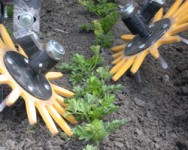Event Details
Date
August 31, 2016
Time
3:00 PM - 9:00 PM
Location
CVP Fresh Market Research Site at Cornell Lake Erie Research and Extension Laboratory
6592 West Main Rd
Portland, NY 14769
Cost
$25.00 CVP enrollee
(additional attendee $25.00 ea.)
$35.00 non-CVP enrollees
(additional attendee $35.00 ea.)
Includes steak dinner and sides
At the Door
$35.00 dinner NOT included
Host
Cornell Vegetable ProgramDarcy Telenko
716-697-4965
email Darcy Telenko
EVENT HAS PASSED
Sustainable and Organic Vegetable Pest Management Field Day
August 31, 2016
Extension Vegetable Specialists, Darcy Telenko, Judson Reid, and Robert Hadad along with Abby Seaman, Vegetable IPM Coordinator, and Cornell faculty and staff Prof. Stephen Reiners, Holly Lange and Rachel Kreis from Prof. Chris Smart's lab will be leading research site tours and answering questions on sustainable and organic pest management options for fresh market vegetable growers. Information will be provided for both conventional and organic growers at all levels of expertise. Industry representatives will have the opportunity to meet with growers to comment on their products. DEC and CCA credits will be available for portions of the day.
Topics:
- Cultivation demonstration by KULT-Kress begins at 3:15 PM
- Weed Management in Sweet Corn, Pumpkin, Winter Squash and Root Crops
- Disease Management in Organic Cucumber and Tomato Production
- Vegetable Disease Control Update
- Insect Management and Specialty Crop Vegetable Variety Demonstration
- Improving Fertility Management in Vegetable Crops
- Updates on Ongoing Research Projects in the Region
Research trials comparing conventional and zone-tillage weed management options in pumpkin and winter squash will be on display. The peculiarities in regards to weed management for each tillage system will be discussed including the practice of a stale-seed bed technique using a herbicide or flame-weeder burn-down treatment as effective weed management tools. In addition, the stale-seed bed technique will be presented for use in beet and parsnip. Growers will be able to view the different weed management tools, look at the economics of utilizing each system, and ask questions. This session will also include a viewing of sweet corn herbicide programs plots to evaluate their effectiveness in controlling weeds. Judson Reid and Abby Seaman will discuss the major tomato and cucumber diseases in New York in high tunnels and field, what symptoms we are looking for, and organic management tools available including resistant varieties and organic pesticides. Research trials will be showcasing varieties with host resistance and organic programs using disease forecasting. Dr. Christine Smart's lab staff will discuss the best crop production practices for managing and controlling disease caused by bacteria, oomycetes, fungi, and viruses. New management options including host resistance, products, or techniques that are available will also be discussed. Robert Hadad, will give a hands-on demonstration of how to identify insect the pests; check for management issues that may improve or decrease insect control; and control options. A number of varieties of a diverse assortment of vegetable crops will be on display for growers to view. Dr. Steve Reiners will discuss the importance of correct crop fertility and how fertility has wide reaching impacts on yield, and more is often not better. Excessive fertility can promote weed growth and insect pressure, while insufficient nutrition leaves crops more susceptible to stresses like disease.
COST: $25 CVP enrollees/$35 all others, includes steak dinner and handouts. Pre-registration required by Monday, August 29, 2016 at NOON. Call 716-652-5400 or register online above. Walk-ins welcome to join the program $35 at the door, but will not receive dinner ticket unless pre-registered by August 29, 2016.
Growers will also be able to view research projects at CLEREL and are encouraged to attend a cover crop workshop the following day, Cover Crop Workshop and Field Day on September 1.
We appreciate the support of BioWorks, KULT-Kress, Larry Romance and Son, Siegers Seed, Texas Refinery, Valent, and Z&M Ag and Turf for sponsoring this event.
A key component of this event is the support provided by industry organizations. Contributing organizations will be recognized as an integral part of this dynamic event. Sponsorships are available for both the Vegetable Field Day and Cover Crop Field Day. Contact Darcy Telenko for more details.



































